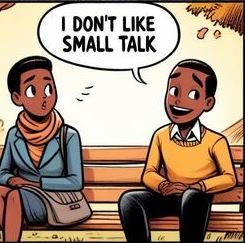
Small talk can seem pointless or difficult, especially if you’re autistic.
But according to shyness expert and psychology professor Dr. Bernardo J. Carducci, small talk actually plays a big role in creating a kinder, more connected society.
The findings of his investigation in no way whatsoever invalidate how autistic people feel about the standard, common small talk.
In fact, I myself have a clinical diagnosis of autism.
But let’s see what a shyness expert has to say about small talk, as this could prove to be quite intriguing to autistic individuals who see no use for this often mundane form of social norm.
- Also, not all Autistics who struggle with or despise small talk are shy.
- Some may be quite talkative!
“Small talk is really, really important,” says Dr. Carducci in his report. He directs the Shyness Research Institute at Indiana University Southeast.
“It helps us connect with people, not just at social events, but in everyday life.”
For many autistic individuals, this can sound overwhelming — especially when social interactions already feel tiring or unclear at a baseline.
Dr. Carducci’s message is this: Small talk isn’t about being fake or pretending to be someone you’re not.
It’s about building small bridges between people.
An autistic person might counter this by pointing out that small bridges can be built with more substantive or deeper discussions.
After all, how do you build a bridge, even a small one, by discussing at length someone’s perspective on the current weather conditions or whether or not they watched “the game” yesterday?
Why Small Talk Matters
Many Autistics wonder why they should bother with small talk. Isn’t it just meaningless chatter?
There are times when we feel it’s necessary, such as when the person who’s interviewing us for a job suddenly introduces us to an employee, then departs momentarily.
We’re now left with that employee. We can’t just stand there and say nothing. The small talk needs to run thick if we want the job.
Dr. Carducci explains that small talk helps people treat each other more kindly. For example it could lead to letting them go ahead of you in line.
It also helps other people see you more positively, according to the report.
If you’re kind to them through small talk, they’re more likely to be kind in return — not just to you, but to others, too. It creates a ripple effect.
Small talk has the potential to gently introduce oneself to others.
What Dr. Carducci may not have thought about in his study, which did not consider autism, is that an autistic person might feel awkward or non-authentic by “gently” introducing themselves and going through the motions of small talk.
While some Autists are okay with this, either by nature or through practice, others find it incredibly awkward and would rather just dive in with more dynamic talk.
The Challenge: Small Talk Can Be Hard

©Lorra Garrick
Let’s be honest: For many people with autism, small talk isn’t easy.
Depending on the volume “required,” it can be tiring or even draining, and at a minimum, just outright boring – making the Autist feel almost like a robot or as though they’re acting on a stage.
They might not know what to say, how to say it, when to stop, when it’s an appropriate time to insert a comment or question, if their gaze distribution to multiple people in a small-talk group is “even,” if they’re standing awkwardly, not smiling enough, smiling too much, saying the wrong thing, when it’s time to laugh or if their laugh even sounds real, not nodding enough, when it’s even time to nod (God, I hate the nodding thing) – the list is endless.
Neurotypicals, from time to time, can experience these things too, but by and large, all of these elements come naturally or intuitively to neurotypicals, especially in casual social contexts.
Dr. Carducci says there’s good news, in that small talk is a skill – perhaps not as intuitive as many believe — and like any skill, it can be practiced and improved.
Well actually, many Autistics will tell you they, indeed, have honed their small talk skills through plenty of practice, including studying their facial expressions and body language in mirrors.
Dr. Carducci offers simple tips to make small talk more manageable and less stressful – even if you’re not autistic and just have social anxiety, have had past trauma, or there’s some other variable that has made small talk extra challenging.
Start Small — Really Small
If starting a conversation feels overwhelming, begin with what Dr. Carducci calls “quick talk.”
This could be as simple as saying “hi” to someone in the elevator, giving a cashier a compliment or commenting on the weather to a neighbor.
These tiny interactions are practice. Over time, they can turn into longer conversations — but they don’t have to as well.
A compliment to a stranger such as in an elevator or in a slow moving line can be based on your special interest! This makes “quick talk” super easy!
One of my obsessions is big, fat, voluminous ponytails. I enjoy complimenting a woman (and sometimes a man!) on their big poofy ponytail.
And who knows, your compliment just might brighten their day. This actually happened when I complimented a stranger’s ponytail at Walmart.
From her point of view, it was a mess, the result of frustration that morning and hurriedly bundling it up. She was thrilled to hear my compliment.
You Don’t Need to Be Funny or Brilliant, just Kind
One common fear is that you need to be witty or clever to make small talk.
You just have to be willing to talk. Kindness is more important than humor.
You can practice by looking for someone who is also alone at a gathering or in a classroom, and saying something simple like, “Hi, I’m Sophea. I don’t know many people here.” That alone can open the door.
Have Topics Ready

If you’re worried about not knowing what to say, try preparing ahead of time.
Read a local news story, notice something funny or interesting about your day, or remember a recent experience you can share.
For example, if people are shopping a lot during the holidays, talk about a funny gift you saw or a store that was really crowded.
Plan Your Introduction
Certainly, many on the Spectrum have been doing this for years.
They may already have several verbatim scripts that roll right off their tongue, choosing whichever script fits the context best.
Many people will ask two questions when they first meet you: “What’s your name?” and “What do you do?”
Prepare your answer ahead of time. For example, instead of saying, “I work at the mall,” you could say, “I sell phones at the mall; some of the questions people ask are really unexpected.”
That gives the other person something to respond to, helping the conversation grow.
Arrive Early
If you’re going to a party, meeting or group event, try to arrive on time or even a little early.
Dr. Carducci points out that showing up late means people are already in groups and deep in conversation, which can make joining in harder.
Arriving earlier means you can help start conversations — and that gives you more control.
Let Conversations Flow Naturally

Freepik/gpointstuio
A good conversation can shift from one topic to another.
You might start by talking about the mall and end up sharing travel stories.
Try not to focus too much on what you’re going to say next.
Instead, focus on what the other person is saying and how your own experiences connect. This takes practice, but it gets easier with time.
Know When to Stop Talking
Sometimes, you might get excited about a topic and talk for a long time — especially if it’s something you’re passionate about.
I’ve witnessed this occur many times by neurotypicals. When autistic people do it, this is called info-dumping.
When NTs do it, the topic tends to be a little broader, such as the time the older man who was doing mold remediation at my home kept talking about his life experiences. Yes, he just wouldn’t stop, but the topics were broad such as various jobs he’d had over the years.
Other NTs may stay on the same topic, but it will still tend to be broad – or at least, not highly specific, as is often the case with Autistics.
Another difference is that when Autistics info-dump, it’s a topic that enthralls them.
A neurotypical who keeps talking to me about the problems they’re having with their boss, even though I’m not expressing interest and find the topic tiring, is talking out of frustration and stress, rather than enthrallment. The mold man may have been talking on and on out of loneliness.
If someone keeps talking about train whistles or shark attacks, inserting this into a general group conversation any chance they could get, then maybe they’re on the Spectrum – unless they’re at a train convention or town meeting about a spate of local shark attacks.
Context is key – but even then, sometimes a person can overdo it.
Ask a question like, “What do you think?” or, “Have you ever done that?” to give others a chance to respond.
Use Quick Exits If Needed
If a conversation feels too long or overwhelming, it’s okay to leave it politely.
Say something like, “I need to talk to a couple of people, but I’ve enjoyed chatting. Let’s talk again later.”
This helps you set boundaries while still being respectful and showing social awareness.
Practice a Little Every Day
Don’t wait for a party or special event to start practicing small talk.
Like exercise, it works best when you do it regularly.
A short chat with a barista, a friendly wave to a neighbor or a compliment to a coworker — all of these are small ways to strengthen your social muscles.
Nevertheless, even with these tips for small talk, they can still be way beyond a doable comfort zone for some autistic people.
People with Autism Spectrum Disorder should not be required or expected to master small talk.
It’s a crying shame that floundering with small talk has cost many autistic people a job interview even though they had more than adequate expertise in the position for which they were applying.
 Lorra Garrick has been covering medical and fitness topics for many years, having written thousands of articles for print magazines and websites, including as a ghostwriter. She’s also a former ACE-certified personal trainer. In 2022 she received a diagnosis of Level 1 Autism Spectrum Disorder.
Lorra Garrick has been covering medical and fitness topics for many years, having written thousands of articles for print magazines and websites, including as a ghostwriter. She’s also a former ACE-certified personal trainer. In 2022 she received a diagnosis of Level 1 Autism Spectrum Disorder.
.


































